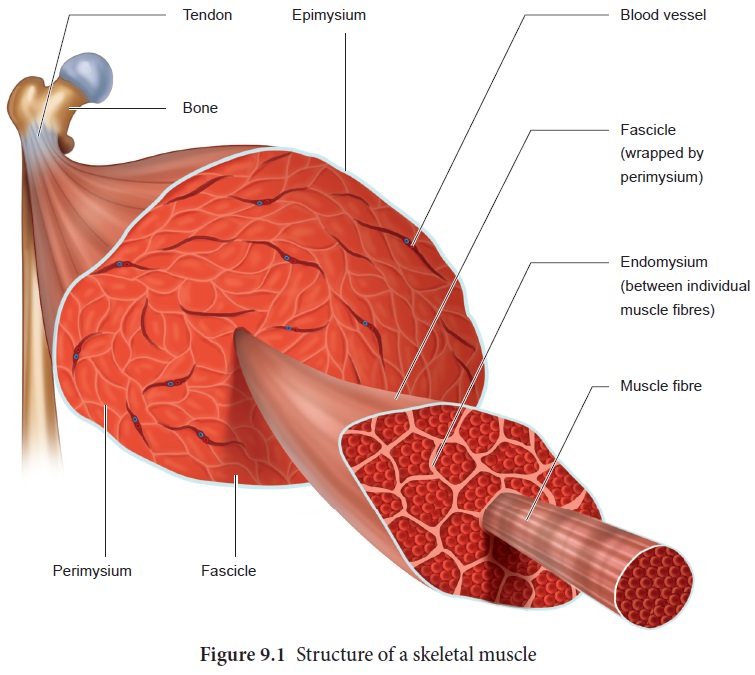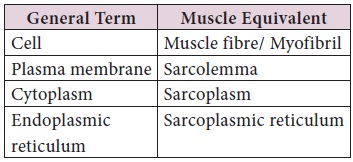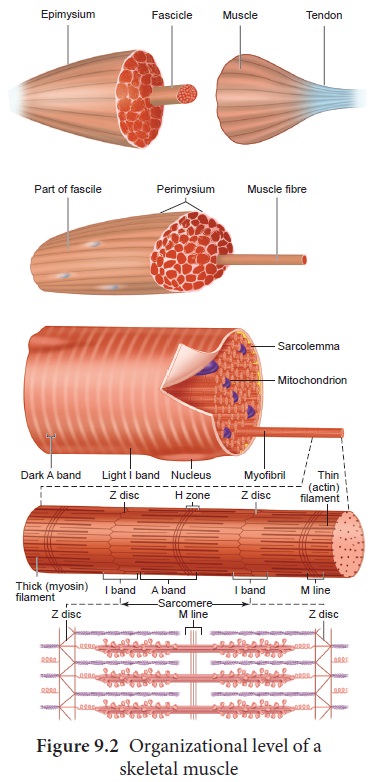Chapter: 11th Zoology : Chapter 9 : Locomotion and Movement
Structure of a skeletal muscle(Voluntary muscle) fibre
Skeletal muscle (Voluntary muscle)
Skeletal muscle is attached to the bone by a bundle
of collagen fibres known as tendon (Figure
9.1). Each muscle is made up of bundles of
muscle fibres called fascicle.
Each muscle fibre contains hundreds to thousands of rod-like structures called myofibrils that run parallel to its length. The connective tissue
covering the whole muscle is the epimysium,
the covering around each fascicle is the perimysium
and the muscle fibre is surrounded by the endomysium.
They control the voluntary actions such as walking, running, swimming, writing
hence termed as voluntary muscles.

Structure of a skeletal muscle fibre
Each muscle fibre is thin and elongated. Most of
them taper at one or both ends. Muscle fibre has multiple oval nuclei just
beneath its plasma membrane or sarcolemma. The cytoplasm of the muscle fibre is
called the sarcoplasm. It contains glycosomes, myoglobin and
sarcoplasmic reticulum. Myoglobin is
a red- coloured respiratory pigment of the muscle fibre. It is similar to
haemoglobin and contains iron group that has affinity towards oxygen and serves
as the reservoir of oxygen. Glycosomes are
the granules of stored glycogen that provide glucose during the period of muscle fibre activity. Actin
and myosin are muscle proteins present in the muscle fibre.

Along the length of each myofibril there are a
repeated series of dark and light bands (Figure 9.2). The dark A-bands (Anisotropic bands) and the
light I-bands (Isotropic bands) are
perfectly aligned with one another. This type of arrangement gives the cell a
striated appearance. Each dark band has a lighter region in its middle

Each H-zone is bisected vertically by a dark line
called the M- line (M-for middle). The light I-bands also have a darker mid
line area called the Z–disc (from
the German "Zwischenscheibe" the disc inbetween the I-bands).
The myofibrils contain the contractile element, the
sarcomere which is the functional
unit of the skeletal muscle. A Sarcomere is the region of a myofibril between
two successive Z- discs. It contains an A-band with a half I-band at each end.
Inside the sarcomere two types of filaments are present namely the thick and thin filaments.
The thick filaments extend the entire length of the
A-band, the thin filaments extend across the I-band and partly into the A-band.
The invagination of the sarcolemma forms transverse tubules(T–tubules) and they penetrate into the junction between the A and
I-bands.
Related Topics